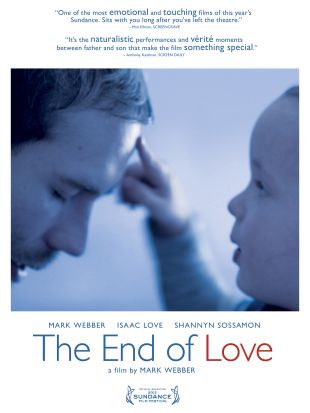
Common wisdom among writers dictates that in order for your work to feel authentic, you write what you know. In his sophomore feature The End of Love, writer/director/star Mark Webber does precisely this, telling the story of an actor and single father named Mark who's struggling to raise his 2-year-old son Isaac (played by Webber's real-life toddler) with no support to speak of. Emotionally raw and authentic, the film portrays the hardships of parenting from a perspective that's deeply compassionate. Unfortunately, having your heart in the right place only goes so far, and despite some commendably brave stylistic choices that give The End of Love a compelling, cinema-verité feel, a near complete lack of narrative drive and some distracting structural flaws prevent this capably acted slice of life from achieving its full emotional impact.
Mark (Webber) is little more than a child himself when he and his wife conceive a baby boy named Isaac. But just two years later, Mark's world is turned upside down when his wife dies unexpectedly. Now, no longer able to ignore the fact that every decision he makes will affect young Isaac (Isaac Love), Mark must navigate the rocky road of parenthood without any support. Meanwhile, Mark's burgeoning relationship with single mother Lydia (Shannyn Sossamon) offers not only a reprieve from loneliness, but a faint glimmer of hope for the future as well.

The child of a single parent himself, Webber has steadily risen up through the ranks to become a reliable and versatile player on the independent film scene. Watching The End of Love, it's obvious that work with such talented filmmakers as Alison Maclean (Jesus' Son), Woody Allen (Hollywood Ending), and Jim Jarmusch (Broken Flowers) has given Webber a keen eye for characterization and storytelling detail. On the surface, The End of Love seems like the perfect vehicle for the emerging director to hone his talents behind the camera to a fine point. Fearless and quite obviously willing to experiment (as evidenced by the memorable use of sound in a scene that finds Mark making a painful confession to Lydia), Webber captures the physically and mentally draining trials of parenting in a manner that many parents, single or otherwise, will likely relate to.
It's a remarkable achievement in many ways, but that effectiveness also proves to be something of a double-edged sword; the mothers and fathers who can actually connect with The End of Love are more likely to find the film's stark realism more excruciating than inspirational, and younger viewers who have yet to become parents won't relate to it. So while on the surface it's refreshing to see a film that avoids the precious clichés typically associated with films about parenting, the sheer bleakness of the story casts a dour cloud over the entire affair. Meanwhile, a subplot concerning Mark's inability to pay rent to his frustrated roommates is handled in a way that actually detracts from the drama, rather than enhancing it. By failing to make it clear that Mark and Isaac live in an apartment with two roommates from the very beginning, Webber inadvertently pulls us out of the drama by forcing us to try and make sense of a crucial plot point that ultimately has a major impact on the story. It's a small misstep that could have easily been avoided with a simple scene or line of dialogue, and an indicator that Webber neglected the details in order to focus on the big picture.
Even so, the impressive, naturalistic performances that Webber coaxes from his son Isaac and Sossamon in particular give the film a rich soulfulness, and cameos by such familiar faces as Amanda Seyfried, Michael Cera, Aubrey Plaza and Jason Ritter -- all essentially playing fictionalized versions of themselves -- put Mark's plight in a somewhat compelling show-business context. That isn't enough to make the film recommendable to anyone except the most curious stargazers, however, and though Webber does flirt with profundity in a climactic scene that finds him teaching wide-eyed Isaac about death, The End of Love essentially ends up precisely where it started -- with a desperate single father facing an uncertain future. Likewise, the decision to exploit such an important and intimate conversation for the sake of art may leave a bad taste in the mouths of some viewers. Chalk it up as an ambitious failure, but watching The End of Love one gets the sense that -- unlike his fictional counterpart -- Webber is the kind of filmmaker capable of learning from his mistakes. If indeed that's the case, his future behind the camera could be very bright indeed.
